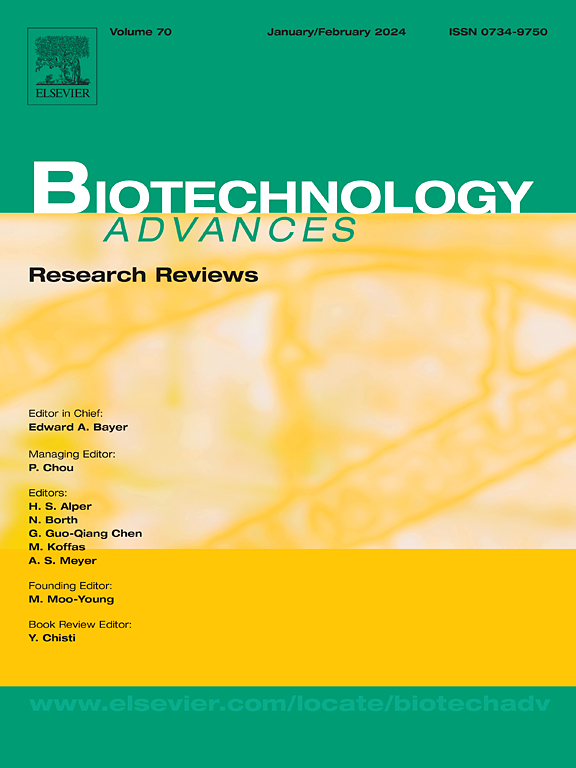Myxobacteria: Versatile cell factories of novel commercial enzymes for bio-manufacturing
IF 12.1
1区 工程技术
Q1 BIOTECHNOLOGY & APPLIED MICROBIOLOGY
引用次数: 0
Abstract
Microbial cell factories for the production of high-quality commercial-grade enzymes have accelerated the development of advanced bio-manufacturing approaches, which in turn are environmentally friendly and sustainable. Myxobacteria, a term commonly used to refer to a group within the Myxococcota phylum, are of great interest for their biotechnological applications due to their ability to synthesize a wide range of natural products and lytic enzymes. These traits are essential for the development of robust expression systems. However, myxobacteria have remained an underexploited resource with industrial relevance. Nevertheless, a growing number of food and industrial enzymes have been identified, highlighting myxobacteria as suitable platforms for exploring enzymes with commercial applications, including biomass conversion. Yet, the discovered lytic enzymes are just the tip of the iceberg given their large genomes and diversity across myxobacteria taxa. Despite holding much promise, challenges in genetic engineering, slow growth, and limitations in metabolic remodeling and expression strategies have limited the construction of myxobacterial cell factories. In this review, we highlight recent advances in the discovery of new myxobacterial enzymes and biomass conversion resources, focusing on their potential applications in agriculture and industry. We describe how myxobacteria and their enzymes can be identified through bioprospecting and computational approaches and summarize current biotechnological applications and synthetic biology strategies for bio-manufacturing. Finally, we discuss the promising potential of myxobacteria as industrial cell factories and address open research questions and future directions.
黏菌:用于生物制造的新型商业酶的多功能细胞工厂
用于生产高质量商业级酶的微生物细胞工厂加速了先进生物制造方法的发展,这些方法反过来又对环境友好和可持续。黏菌是一种通常用于指黏菌门中的一组的术语,由于它们能够合成广泛的天然产物和裂解酶,因此在生物技术应用方面具有很大的兴趣。这些特征对于强健表达系统的发展至关重要。然而,黏菌仍然是一种未充分开发的具有工业意义的资源。尽管如此,越来越多的食品和工业酶已经被确定,强调黏菌是探索具有商业应用的酶的合适平台,包括生物质转化。然而,考虑到它们庞大的基因组和黏菌群的多样性,发现的裂解酶只是冰山一角。尽管前景广阔,但基因工程方面的挑战、生长缓慢以及代谢重塑和表达策略的局限性限制了黏菌细胞工厂的建设。本文综述了近年来黏菌酶和生物质转化资源的研究进展,重点介绍了它们在农业和工业中的潜在应用。我们描述了如何通过生物勘探和计算方法鉴定黏菌及其酶,并总结了目前生物技术的应用和生物制造的合成生物学策略。最后,我们讨论了黏菌作为工业细胞工厂的潜力,并指出了开放的研究问题和未来的发展方向。
本文章由计算机程序翻译,如有差异,请以英文原文为准。
求助全文
约1分钟内获得全文
求助全文
来源期刊

Biotechnology advances
工程技术-生物工程与应用微生物
CiteScore
25.50
自引率
2.50%
发文量
167
审稿时长
37 days
期刊介绍:
Biotechnology Advances is a comprehensive review journal that covers all aspects of the multidisciplinary field of biotechnology. The journal focuses on biotechnology principles and their applications in various industries, agriculture, medicine, environmental concerns, and regulatory issues. It publishes authoritative articles that highlight current developments and future trends in the field of biotechnology. The journal invites submissions of manuscripts that are relevant and appropriate. It targets a wide audience, including scientists, engineers, students, instructors, researchers, practitioners, managers, governments, and other stakeholders in the field. Additionally, special issues are published based on selected presentations from recent relevant conferences in collaboration with the organizations hosting those conferences.
 求助内容:
求助内容: 应助结果提醒方式:
应助结果提醒方式:


